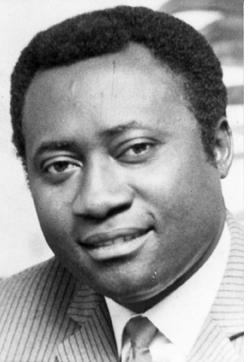|
 Kabasele, Joseph "Le Grand Kalle" (Kabasele Tshamala), celebrated Congolese singer and band leader; born Matadi, Congo-Kinshasa, Dec. 16, 1930; died Kinshasa, Feb. 11, 1983. Kabasele, Joseph "Le Grand Kalle" (Kabasele Tshamala), celebrated Congolese singer and band leader; born Matadi, Congo-Kinshasa, Dec. 16, 1930; died Kinshasa, Feb. 11, 1983.
Kabasele was born to a prominent Congolese family that included Joseph Malula, who rose to become a cardinal in the Catholic church. As one of the period's better educated Congolese—he completed secondary school—Kabasele gained employment as a typist at a succession of commercial firms in colonial Léopoldville (Kinshasa). Music was his true calling, however, and he found an opportunity to pursue it around 1950 at a new recording studio called Opika. There he joined the aggregation of session musicians that included Jhimmy (Zacharie Elenga), the era's biggest star, established guitarists Georges Doula and Albert Yamba-Yamba, and a number of younger players, who, like himself, saw music as the key to a future outside the humdrum realm of business and the colonial administration.
One of the early bands to emerge from this mix joined Kabasele, Doula, and Yamba-Yamba into a combo called Groupe Doula Georges. Band became known as OTC after making a promotional film for a local radio station that used the call letters OTC. Kabasele patterned his style after the Corsican charm singer Tino Rossi whose soaring vocals and sentimental songs were popular among urban Congolese. Kabasele's earliest hits came in the company of Opika's younger musicians, especially guitarist Nicolas Kasanda (later Docteur Nico) and his guitar-playing brother Charles "Dechaud" Mwamba. "Para-Fifi" (1952) sang the praises of a radio announcer from across the Congo River in Brazzaville. "Kale-Kato" (1952) told of Kabasele's love for a certain Katherine and was one of the first records to introduce saxophone into Congolese music as Belgian sax player Fud Candrix sat in on the session.
During the period 1953-1955 a new band with Kabasele, Nico, and Dechaud at its center evolved from the collection of Opika session players. They called themselves African Jazz, borrowing the name but little of the style from American music. African Jazz played Latin-style songs and contributed heavily to the evolving Congolese rumba, a variant of the Cuban son. Kabasele became known as "Le Grand Kalle" as his popularity rose to an unparalleled level. Other singers strove to copy his style, so much so that people began to talk of a Kabasele school or an African Jazz school.
Kabasele's most memorable song, "Indépendance Cha Cha" from 1960, celebrated Congo's impending freedom from Belgian colonial masters and lauded Congolese politicians by name. Record became a continent-wide hit as, one by one, African countries won their independence. Another Kabasele composition, "Bilombe ba Gagne" (the courageous have won), recounted the indignity of life under Belgian rule. When independence quickly degenerated into crisis, Kabasele's "Toyokana Tolimbisana na Congo" (let's understand and forgive in the Congo) pleaded for Congolese unity.
With his African Jazz and Surboum African Jazz labels, Kabasele became Congo's first African music publisher in 1960. In addition to records by his own group, Kabasele issued the works of rival band O.K. Jazz. Kabasele proved to be an erratic leader, a trait that fomented dissension and eventually caused all the musicians of African Jazz to desert him in 1963. He re-grouped by joining forces with singer Jean Bombenga, an early protégé, and his Vox Africa. This new group was also called African Jazz, but it failed to reach the level of the original. After sporadic recordings, concerts, and personnel changes, the group disbanded in 1969.
In between gigs with the new African Jazz, Kabasele recorded in Europe with a studio group of varying personnel called African Team. Group included Cameroonian sax player Manu Dibango, Congo-Brazzaville saxophonist Jean Serge Essous, and Cuban flutist Don Gonzalo playing an Afro-Latin-jazz fusion. In the early seventies Kabasele served as president of SONECA, the performing rights society of Congo-Kinshasa (Zaire). He took to the stage only rarely as he fought off the effects of chronic hypertension. Two sojourns in Paris for medical treatment brought only temporary relief. In 1980 Kabasele was honored with the title grand maître (grand master) of Congolese (Zairean) music by the musicians union UMUZA. He died less than three years later.
Kabasele was one of the great African singers of the twentieth century. He possessed the voice and the style against which all Congolese singers would be measured. His band, African Jazz, became the model for nearly every Congolese group that followed. His contributions to the evolution of the Congolese rumba moved fellow Congolese to call him the "father of Congolese music."
© 2011 Gary Stewart
SELECT DISCOGRAPHY
With African Jazz (original): Merveilles du Passé (Sonodisc CD36503) sixties recordings reissued 1991; Grand Kalle & L'African Jazz vol. 1 (Sonodisc CD36579) sixties recordings reissued 1997; Grand Kalle & L'African Jazz vol. 2 (Sonodisc CD36582) sixties recordings reissued 1997.
With African Jazz (new formation): Le Grand Kalle & L'African Jazz (Sonodisc CD36536) sixties recordings reissued 1993; Grand Kalle & L'African Jazz (Sonodisc CD36585) sixties recordings reissued 1997.
With African Team: Grand Kalle & L'African Team (Sonodisc CD 36543) sixties recordings reissued 1994; Grand Kalle & L'African Team (Sonodisc CD36570) sixties recordings reissued 1997.
SELECT BIBLIOGRAPHY
M. Lonoh, Essai de commentaire sur la musique congolaise moderne (Kinshasa, 1969); S. Bemba, 50 ans de musique du Congo-Zaire (Paris, 1984); Hommage à Grand Kalle (Kinshasa, 1985); C. Stapleton & C. May, African All-Stars (London, 1987); M. Dibango, Three Kilos of Coffee (Chicago, 1994); Manda Tchebwa, Terre de la chanson (Louvain-la-Neuve, Belgium, 1996); G. Stewart, Rumba on the River (London and New York, 2000).
|

